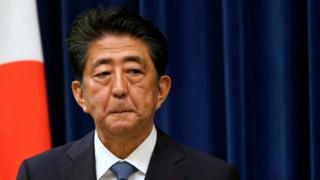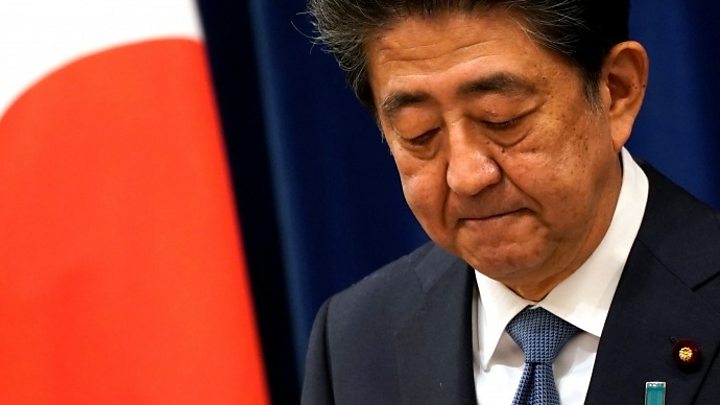 Image copyright
Image copyright
Reuters
Shinzo Abe announced his resignation for smartly being causes on Friday
Revisionist nationalist or pragmatic realist? Defining Shinzo Abe and his legacy following his resignation as Japan’s longest serving submit-battle high minister divides commentators both within Japan and internationally.
To his critics, Mr Abe represents the attitudes of an older, conservative abilities intent on downplaying Japan’s wartime yarn, while pursuing a doubtlessly troubling and overly assertive international coverage.
To his supporters, the high minister has boosted the nation’s world standing, realizing its nationwide pursuits by harmonizing its professional ambitions with its clout as the enviornment’s third largest economy.
If truth be told, both images of Mr Abe are valid.
As an instinctive conservative baby-kisser intent on restoring Japan’s pride both at dwelling and in one more nation, Mr Abe labored continuously at some stage in his eight years quite than job to bolster the nation’s nationwide identity and historical traditions.
He reaffirmed the role of the emperor in Japan’s civic life (ushering in the unusual “Reiwa” abilities and helping notably to manage the transition to a peculiar emperor following the abdication of Emperor Akihito in April 2019); moved a ways flung from overly self-severe historical narratives in excessive-college textbooks; and sought (in a roundabout way unsuccessfully) to revise the nation’s submit-battle structure.
This nationalist agenda has been primarily domestically focused.
In distinction, in international affairs (whether or now not in safety or economic coverage), Mr Abe has been a quintessential pragmatist.
He strengthened present alliances (most notably with the US) and developed unusual partnerships with regional and world actors, both democracies and authoritarian regimes, self reliant of their ideological leanings.
Image copyright
Getty Photos
Shinzo Abe pictured at the Imperial Palace ahead of Emperor Naruhito’s ascension to the throne
Mr Abe’s achievements as high minister comprise, admire so many political careers, been the outcomes of a aggregate of factual honest correct fortune and shrewd electoral calculation and timing.
His victories in six electoral contests (three decrease and three upper condominium contests since 2012) were facilitated by Japan’s outdated and fragmented opposition events and by Mr Abe’s unremitting level of curiosity on delivering economic prosperity for a domestic voters that is non-ideological and prizes steadiness at dwelling over international coverage adventurism in one more nation.
Success for Mr Abe has been done (as used to be the case alongside with his comparably reformist predecessors, equivalent to Junichiro Koizumi in the 2000s, or Yasuhiro Nakasone in the 1980s) via tiring, incremental reforms, in preference to abrupt departures from the consensual model of politics that has typified submit-battle Japanese politics.
In safety coverage, the outcomes of this painstaking, gradualist formula could honest be viewed in a quite plenty of of key areas.
They encompass the institution of Japan’s National Safety Council (NSC) in 2013; the passage of a peculiar Grunt Secrecy Laws in 2014 and provisions allowing Japan’s Self-Defence Forces to do half in collective safety operations; annual will increase in Japan’s defence spending (a 13% make bigger over Mr Abe’s time quite than job); the development of a more versatile defence doctrine; and the acquisition of treasured unusual army hardware, including F-35 fighter plane and unusual Izumo-class helicopter-equipped destroyers succesful of bettering Japan’s regional energy projection capabilities.
As now not too long ago as this month, Defence Minister Taro Kono has talked ambitiously of Japan doubtlessly joining the 5 Eyes intelligence partnership between the UK, US, Australia, New Zealand and Canada – an indication of how Mr Abe’s “proactive pursuit of peace” formula has turn out to be the unusual same outdated in Japanese international coverage.

Media playback is unsupported on your arrangement
Mr Abe must always be credited with success in affirming a end relationship with Donald Trump and utilizing diplomacy as a tool to offset just among the bullying tactics of The United States’s transactional president.
While Japan remains, admire so many US allies, below stress to make bigger its defence spending and host-nation purple meat up for US troops, Mr Abe has averted a debilitating trade battle with the US and the fundamentals of the alliance partnership remain sturdy.
More broadly by formula of international coverage, Mr Abe has been a diplomatic innovator and demonstrated a capacity for strategic pondering that marks a pointy departure from previous premiers, who comprise customarily been either reactive to exterior events or inclined passively to observe Washington’s lead.
This trade below Mr Abe is reflected in a peculiar host of most up-to-date strategic partnerships with India and Australia; defence agreements with South East Asian countries; ambitious bilateral international and defence partnerships with the UK and France; and the articulation of a peculiar Indo-Pacific vision intended to harmonize economic and safety coverage with a vary of countries spanning the Pacific and Indian Oceans.
Image copyright
EPA
Mr Abe is Japan’s longest serving high minister
Mr Abe’s international coverage innovation has been matched by a raft of heroic multilateral and bilateral trade initiatives, for which the high minister has needed to confront key domestic political constituencies, in particular contained in the agricultural sector.
He performed a decisive role in reinforcing the Trans-Pacific Partnership (TPP 11); secured a step forward trade settlement with the European Union in 2019; and negotiated a quite plenty of of monetary and pattern agreements with China in 2018.
Sensibly, while Mr Abe has remained acutely attentive to the geostrategic possibility posed by China, this has now not been allowed to block opportunities for pragmatic co-operation with President Xi Jinping.
Pragmatism has furthermore underpinned the high minister’s signature “Abenomics” formula to domestic economic administration, taking into consideration innovation in the “three arrows” of fiscal, monetary and structural coverage.
Here, nonetheless, success has been arguably less substantive and more presentational – per the Abe administration’s level of curiosity on messaging as powerful as provide.
Reflecting the scenario of reworking company and consumer sentiment, Japan’s Uncomfortable Domestic Product (GDP) in the 2nd quarter of this year remains, at ¥485 trillion ($4.6 trillion; £3.5 trillion), lower than the ¥504 trillion recorded in the January-March 2013 quarter rapidly after Mr Abe took web site of job.
Despite all these valuable achievements, Mr Abe’s public standing at dwelling has in the final year taken a heavy battering in the wake of the make bigger in an unpopular gross sales tax from 8% to 10% in 2019; a series of detrimental corruption scandals; partial achievements in delivering on the promise of “womenomics”; and, most important of all a blended yarn, in confronting the Covid-19 crisis and the linked-disappointment from the postponement of the Tokyo 2020 Olympic Video games.
Image copyright
Reuters
Mr Abe seems at the closing ceremony of the Rio 2016 Olympics
With approval ratings for the high minister and his cabinet flat-lining in the mid-30s – the bottom it has been since 2012 – it’s no surprise that Mr Abe, confronted by a recurrence of his power smartly being complications, has chosen to resign.
He departs the political stage certainly deeply disillusioned now not to comprise done just a few of his key political ambitions – most notably his cherished operate of constitutional revision and the resolution of territorial disputes, including the “Northern Territories” negotiations with Russia left over from World Battle Two.
Post-Abe, Japan’s political scene will remain rather stable in the immediate timeframe, with the Liberal Democratic Event securely in energy, given its commanding majorities in both houses of the Japanese parliament and the absence of any formal responsibility to name a general election unless the autumn of 2021.
Nonetheless, the fight to be triumphant Mr Abe has already begun, with Shigeru Ishiba, a outdated defence minister and Mr Abe’s longstanding celebration rival already signalling his arrangement to contest the premiership.
Mr Ishiba has astronomical public allure and his message in favour of elevated economic equality is susceptible to play smartly with most of us.
Nonetheless, the decision on a successor will be decided by celebration contributors (doubtlessly including both parliamentarians and prefectural representatives), who are susceptible to be influenced by a vary of issues.
Image copyright
Getty Photos
Shigeru Ishiba, pictured with Mr Abe, has signalled his arrangement to contest the premiership
A continuity candidate, equivalent to outdated international minister Fumio Kishida (who is viewed as uncontroversial), or a celebration insider equivalent to Chief Cupboard Secretary Yoshihide Suga, could honest all prove effective.
More wild-card alternatives encompass Mr Kono (who lacks factional energy contained in the celebration) and Atmosphere Minister Shinjiro Koizumi, who remains smartly-appreciated by the voters but whose relative formative years (at 39 years veteran) could honest depend towards him.
Just about the industrial and safety challenges confronted by Japan, every of these candidates is susceptible to want to acknowledge and capitalize on Mr Abe’s genuinely substantive coverage achievements.
The vivid, incrementalist successes of the outgoing premier are furthermore per the political traditions of the LDP and provide the safest and politically least controversial foundation for any future leader desirous to rebuild have confidence and expand the purple meat up of a discriminating and non-ideological Japanese voters ahead of any future general election.
However Mr Abe’s aspirational, but at simplest partially realised nationalist ambitions, his pragmatic achievements are susceptible to be his most enduring legacy.
